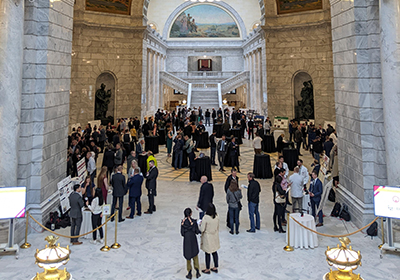2022 Bench to Bedside competition returns to the Utah Capitol
After a multi-year hiatus, the Bench to Bedside Competition Night event returned to the Utah State Capitol Building on April 11, showcasing collegiate teams from across Utah. Despite near blizzard-like conditions, more than 300 people attended the event.
Led by the Center for Medical Innovation, the Bench to Bedside program challenges students to identify and address opportunities for improvement in the current health care market. Interdisciplinary student teams collaborate with practicing health care professionals and industry experts to find novel solutions to common problems.
More than 30 teams and 125 students representing the University of Utah, Brigham Young University, Utah State University, Southern Utah University, Rocky Vista University College of Osteopathic Medicine, Utah Technical University and Salt Lake Community College participated in this year’s competition.
“Utah’s future success lies in our ‘innovative approach’ with national and global impact. The Bench to Bedside competition teaches students to approach challenges with inventive ways of thinking and problem solving,” says Michael Good, CEO of University of Utah Health, executive dean of Spencer Fox Eccles School of Medicine, and senior vice president for Health Sciences. “I commend everyone who competed this year. Keep building and experimenting on your ideas. You are changing the world with your inventions.”
Over the course of the academic year, interdisciplinary student teams are provided training in problem identification, device commercialization strategies and prototyping funds to develop their projects. The program culminates in a competition night event at the Utah State Capitol Building each spring. However, due to the COVID-19 pandemic, the competition has been conducted virtually for the past two years.
At the event, hundreds of students, university faculty, community leaders and industry partners joined for the night to review each team’s products, network and announce the award winners in a celebration of Utah’s continued commitment to life sciences innovation.
With scores compiled from more than 90 judges comprised of clinicians, industry experts and community members, the teams with the top all-around scores participated in a final Q&A with judges to determine our top award winners.
In a statement prior to the competition, Bryan McRae and Troy D’Ambrosio, interim co-directors of the Center for Innovation said: “Bench to Bedside continues to be one of the most impactful programs on-campus. Year after year, we’ve seen student teams come up with innovative, practical solutions to some of the major pain points clinicians and health care professionals face on a day-to-day basis, and it’s truly amazing to see it all come together. Not to mention we’re thrilled to be back at the State Capitol this year and have a proper showcase of all our teams to the community of judges, mentors, friends, and family who make B2B possible.”
The 2022 winners
GRAND PRIZE AWARDS
GRAND PRIZE AWARD WINNER – $20,000
- LERC Medical developed the Dual Function Esophageal Probe, a device that measures oxygen saturation and temperature centrally via the esophagus, improving accuracy and reducing the number of wires in the surgical theatre.
GRAND PRIZE RUNNER-UP AWARD – $10,000
- ADMIX created a simple, low-cost buffering device that dentists can use to administer acting anesthetic more effectively.
LEGACY GRAND PRIZE AWARD WINNER – $20,000
- uAir developed a mini asthma inhaler for people who have asthma. The device is highly portable (about the size of a key fob), readily accessible, and more affordable than other inhalers. The technology is based on the only miniature dose inhaler valve in the world. (uAir won the Grand Prize Award in the 2021 competition.)
BEST IN CLASS AWARDS – EACH $5,000
BEST IN MEDICINE AWARD WINNER
- The Lybb Tech Guardian Walker detects imminent falls using electronic sensors and automatically applies the walker brakes to prevent falls. The device could help prevent as many as 8 million fall injuries among seniors each year.
BEST IN BUSINESS AWARD WINNER
- VAnA is a Virtual Anesthesia Assistant that is changing the way anesthesia teams work through the seamless integration of anesthesia equipment, allowing for improved patient safety and decreased physician burnout. Features include voice-controlled activity recording for nurse anesthetists and patient overview dashboards for attendings.
BEST IN ENGINEERING AWARD WINNER
- EaziStep is an alternative to crutches that works with the body’s natural biomechanics to improve energy-return and reduce pressure points. The team says the device has the potential to accelerate recovery and return patients to activity faster, all while keeping the user hands-free.
BEST IN DIGITAL HEALTH AWARD WINNER
- Relay is a mobile app for team-based addiction recovery and self-improvement that helps recovering individuals connect with others. It eases the isolation often experienced by those struggling to overcome addictions and mental health challenges.
GLOBAL HEALTH AWARD WINNER
- Protean Medical provides surgeons in a wide range of specialties with a versatile light source at the surgical field level; all in an inexpensive, wireless, disposable package.
ECCLES & MARRIOTT LIBRARIES AWARD WINNER
- NeoTec has developed a vibration-dampening device to mitigate the risk of hemorrhaging in neonates during emergency transportation
CONSUMER’S CHOICE AWARD – $2,500
- SaltTech has developed an improved pulse oximeter that more accurately assesses oxygenations levels for individuals regardless of levels of skin pigmentation.
Since its inaugural year in 2010, the Bench to Bedside has mentored over 1,300 participants on over 300 project teams, resulting in over 200 patents filed, the launch of 80 companies, and $1.3 million in milestone funding awarded to winning teams. Participating students—who come from multiple disciplines ranging from architecture to the arts, engineering to law, and biology to business—learn the power that diversity of thought can bring to the innovation process.
For more information, please visit the Center for Medical Innovation or contact Adam Ruechel (adam.ruechel@hsc.utah.edu), Bench to Bedside Program manager.
This story originally appeared here.
